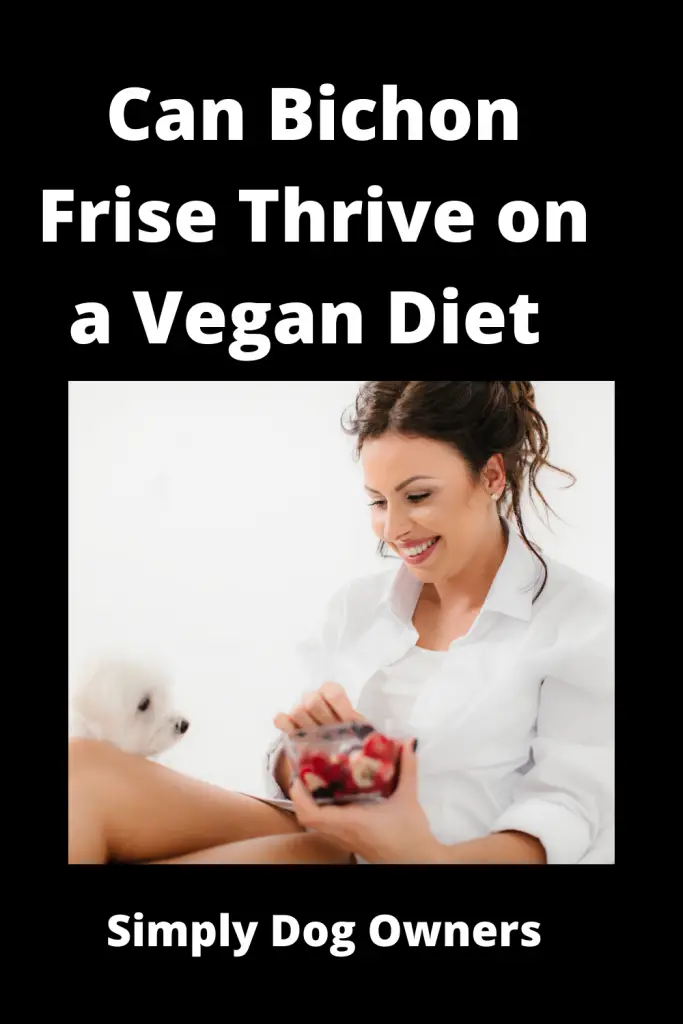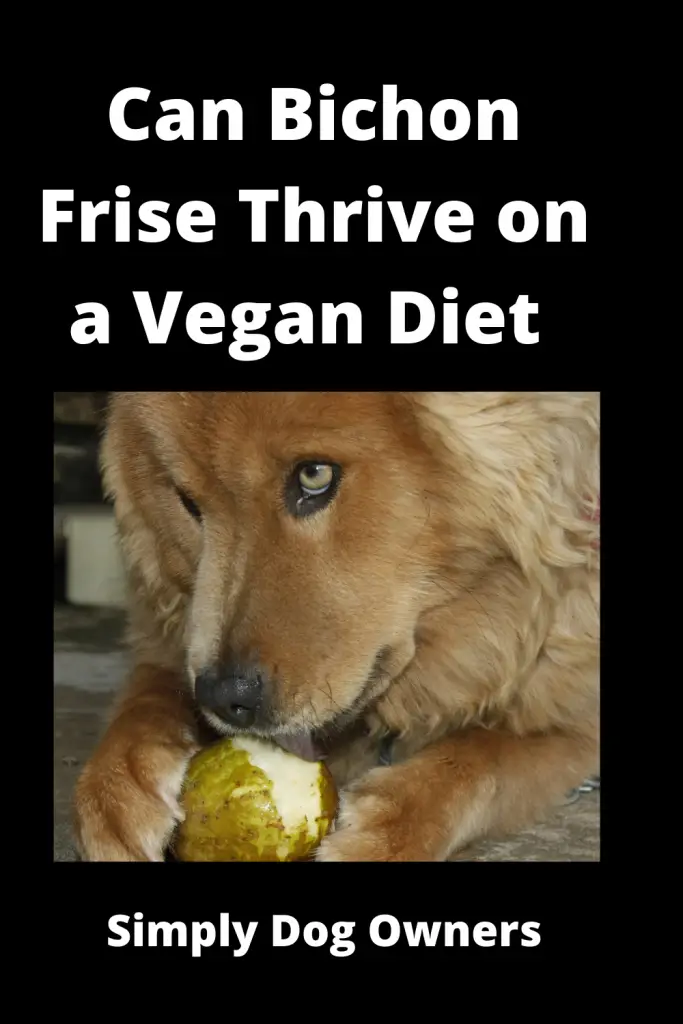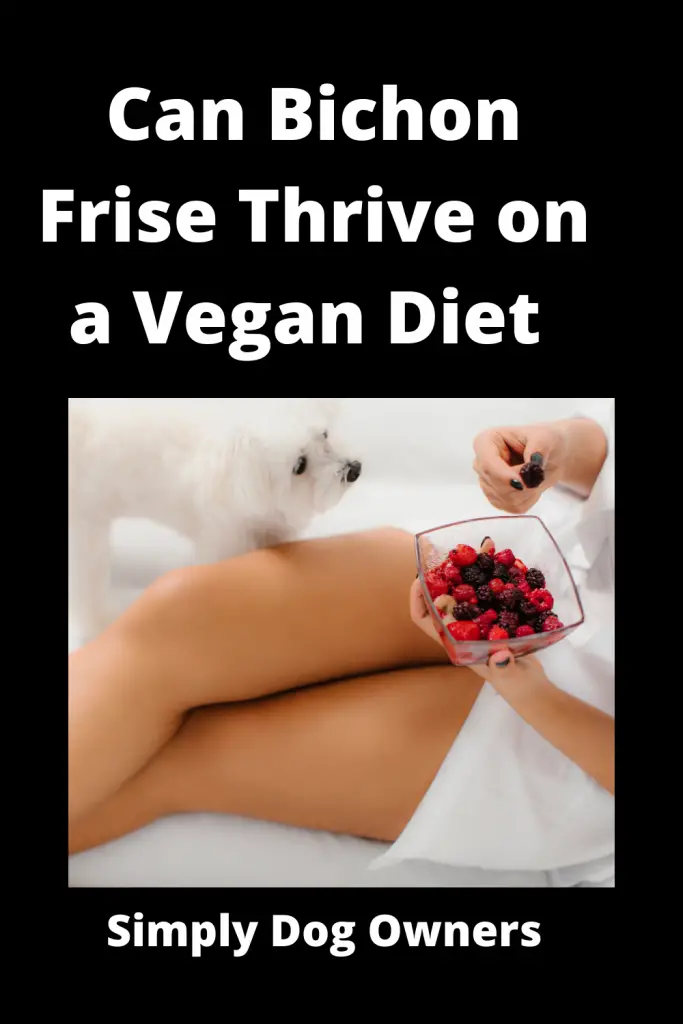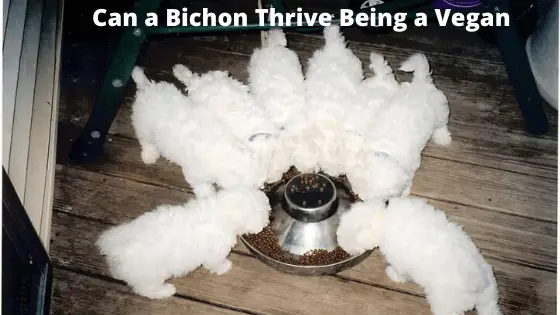Bichon Frise Thrive on a Vegan Diet / Is it safe for Bichon Frise to Eat a Vegan Diet?
“All life deserves respect, dignity, and compassion, all life”
As veganism enters the mainstream, Bichon’s parents are increasingly looking into vegan diets for their beautiful companions. But your main concern will be whether a vegan diet is appropriate for your loveable Bichon Frise or not. While your puppy diet is plant-based, it is kinder to the environment and to farm animals, but before considering a vegan diet for your best friend, it is important to understand the potential benefits and drawbacks.
In our 30 Years of Raising bichon’s we have found that not only is it Safe for Bichon to eat a vegan diet, but they can also Thrive on it – the following Article will chart the path
What is Veganism?
First of all, you should have a clear concept about the vegan diet or veganism if you are considering a vegan diet for your Bichon Frise. A vegan diet contains only plants and food made from plants (such as vegetables, grains, nuts, and fruits). Food coming from animals like meat, dairy products, and eggs is not consumed by vegans.
Veganism represents a philosophy and way of living which seeks to exclude as far as is possible and practicable all forms of exploitation of, and cruelty to, other animals for food, clothing or any other purpose, and promotes the development and use of animal-free alternatives for the benefit of humans other animals and the environment.
According to the veterinarian and former president of the U.S. Humane Society Dr. Michael Fox, there are two main reasons people elect to feed their dogs a vegan diet,
- Personal ethics (the humans)
- Food allergies (the dogs)
Dogs with food allergies are typically sensitive to specific animal proteins, and eliminating processed animal products from their diet can help so long as the replacement diet is carefully formulated to provide essential nutrients.
Going vegan is one of the best things you can do to help end animal cruelty. By refusing to pay for animal products, you reduce demand for them, ensuring fewer animals are bred to suffer and die on farms and in slaughterhouses.

Vegan Diet and Food Evolution for Bichon Frise
It is true that your puppy Bichon Frise belongs to the order Carnivores, but they are actually omnivores. A carnivore is an animal that gets food from killing and eating other animals while omnivores an animal or person that eats a variety of food of both plant and animal origin.
Your Bichon body has the ability to transform certain amino acids (the building blocks of protein) into others, meaning that dogs can get all the amino acids they need while avoiding meat.
Your puppy also has 10 genes that are responsible for starch and glucose digestion, as well as the ability to produce amylase, an enzyme that functions to break down carbohydrates into simple sugars something that carnivore lack.
If you are thinking about well-planned vegan diets for your Bichon fries, it should follow healthy eating guidelines, and contain all the nutrients that his bodies need. According to British Dietetic Association and the American Academy of Nutrition and Dietetics, “Vegan diet is suitable for every age and stage of life”.
If your Bichon Frise having eggs and dairy products in his diet and avoiding all other animal products than he can be referred to as an Ovo-Lacto vegetarian. It does not create many nutritional challenges for your fluffy companion. In fact, eggs have the highest biological value of all the protein sources commonly used in your pet foods. Eggs are an excellent source of protein for dogs.
A seed, nut or grain, on the other hand, doesn’t have as high of a biological value; its amino acid profile isn’t as complete as that of an egg. So we need to look at the type of protein, the quality of protein, as well as the amount. However, it is possible to combine different plant proteins so that all of the pup’s amino acid requirements are met.
If you want pure vegan diet for you Bichon fries that does not include any animal products though a little trickier but not impossible. It requires a lot more effort on your part to ensure your Bichon pup is eating a healthy, balanced diet that leads to a healthy, balanced life.
Bichon puppies grow and develop rapidly, going from newborn to adult in less than a year, so their nutritional needs are different from those of adults. Maintaining a good body condition is most important, Important specific nutrients include protein, calcium-and-phosphorous balance, and the caloric density of the diet.
The choice isn’t one to be taken lightly and should come with a solid understanding and reasoning behind it but ultimately, it’s an option you can consider alongside your vet (and your Bichon pup, of course).

Can Dogs Eat Grapes?
If you are offering grapes and raisin to your lovely Bichon or your fluffy love the grapes. In either case your concern whether it safe or not.
Grape and raisin (dried grapes) toxicity is well known in dogs. Although the exact substance that causes the toxic reaction is not yet known, your Bichon should not eat grapes and raisins because even small amounts can prove to be fatally toxic for a pup.
Your beloved Bichon Frise of any age can be affected. Grapes and raisins are bad for dogs because one of the most serious complications of grape/raisin toxicity is they can cause severe kidney damage leading to acute (sudden) kidney failure with a lack of urine production (anuria).
However, kidney failure is not seen in all Bichon after ingestion of grapes or raisins, and again, the reason why some Bichon puppies are affected excessively, while others are not, is still being studied
But if it happens, this is an emergency, needing immediate treatment. If you are 100% sure that your dog ingested grapes or raisins within the last two hours, you will need to induce vomiting as soon as possible, before all the toxins in the fruit can be absorbed. If your dog has already vomited, do not try to force more vomiting. Call your veterinarian for advice.
Can Bichons Eat Bananas?
You love to eat bananas and it is a healthy snack for you. But are bananas safe for your Bichon Frise? The short answer is yes. Your fluffy Bichon can eat bananas in moderation.
Banana is a healthy snack for your Bichon. It contains a high amount of potassium, vitamin B6, and vitamin C. In fact, sometimes veterinarians recommend this fruit as a healthy alternative to fatty, salty treats.
The fruit is also high in fiber, which can help if your dog is having gastrointestinal problems, and magnesium, which promotes bone growth and helps the body produce protein and absorb vitamins.
However, like with any food item, you should only feed your Bichon bananas in moderation, especially since they contain a lot of sugar.
Bananas are low in sodium and cholesterol, but due to the sugar content in bananas, so your fluffy Bichon should only eat them as a treat, and not as a regular part of their diets.
If you fed your Bichon bananas in excess, it can lead to constipation and owners should never feed their dog a banana peel.
Bananas aren’t toxic to your beloved puppies. However, they are difficult to digest and can create a blockage if eaten whole or in large pieces.
As with any new addition to a dog’s diet, take a moment and speak with your veterinarian about your Bichon’s nutritional needs.
When you add bananas as a treat for your Bichon, l suggests watching for allergies, weight changes and possible signs of a sensitive gastrointestinal system.
“From practical experience, some dogs love bananas and some hate bananas,” says Cathy Alinovi, DVM. “As long as bananas are just a snack, not the whole meal, and the dog isn’t allergic to the banana, then there’s no reason not to feed them.”
Can Bichons eat Carrots?
Yes, your Bichon Frise can eat carrots. In fact, not only is this vegetable safe, but it also can serve as a healthy, low-calorie snack for your pup.
Carrots offer Bichon owners an affordable and healthy snack for their puppies. In addition, this vegetable is great for rewarding good behavior, without the calorie count linked with biscuits and other fatty treats.
Some vets even recommend cold or frozen carrots if your Bichon puppies are teething, as a way to ease teething discomfort.
Frozen carrots make inexpensive and edible chew toys for Bichon puppies. Furthermore, chewing on carrots can also help improve your Bichon’s dental health. More importantly, carrots are an excellent source of vitamin A, potassium, and fiber, among other vitamins.
Raw and cooked carrots are healthy options for Bichon and make a nutritious add-in to meals.
While carrots are generally safe, it is important to cut whole carrots and even carrot sticks into bite-size chunks before feeding them to your Bichon. As a result, you will prevent choking.
Too much sugar, even the natural kind, can cause weight gain, which can lead to other health problems. The same rules apply to serve carrots as they do with any other treat, so carrots should make up no more than 10% of your Bichon’s daily calories.
Is Pumpkin Good For Bichons?
Can Bichons eat pumpkin? Or Human can eat pumpkins, is it safe for my beloved Bichon Frise? You may be finding answers to these questions if you want to share a fall pumpkin treat with your Bichon, or maybe you’ve heard pumpkin is good for an upset tummy.
The short answer is yes. Your fluffy Bichon Frise can have pumpkin. Not only is pumpkin a nice change of pace for your pup’s mouth, but it is also a healthy people food to add to your Bichon’s diet.
However, you must be cautious and serve pumpkin to your dog safely and in moderation. As always, you should ask your veterinarian before sharing people’s foods with your lovely Bichon, even pumpkin.
Here’s what you should know about feeding pumpkin to your Bichon Frise.
Pumpkin is very healthy for your Bichon. It is a fiber-rich food that also contains important vitamins and minerals, such as vitamins A, E, and C, and potassium and iron. But be careful, not all pumpkins are created equal.
The pumpkin that you carve for Halloween, for example, is potentially full of mold and bacteria after it’s been sitting on your front terrace for several weeks. It’s not a good idea to feed any pumpkin you are using as decor to your Bichon. Don’t take the risk.
Instead, serve the seeds and the flesh of fresh pumpkins to your Bichon. These are both safe for your pup. Pumpkin can go rancid very quickly so if you choose to serve raw pumpkin it’s vital that it is the freshest you can find.
Pumpkin can ease digestion in several ways. The soluble fiber content in pumpkin adds bulk to your Bichon’s stool by absorbing water, supply energy to cells, stimulate water absorption, and lower the pH level of the intestines.
Pumpkin fiber also acts as a prebiotic (food for beneficial bacteria). They stimulate the growth or activity of these beneficial bacteria in the intestines and inhibit the growth of harmful bacteria. Fiber does this by lowering the pH level and providing the necessary nutrients these bacteria need.
Plain canned pumpkin is the healthiest choice for your cute Bichon. Both fresh and canned pumpkins are good sources of nutrients and fiber, but canned pumpkin contains a higher concentration of fiber and nutrients compared to the fresh pumpkin. This is because fresh pumpkin has higher water content than canned pumpkin.
However, canned pumpkin with added salt, spices, sugar, or other additives can irritate your Bichon’s stomach further, counteracting the beneficial effects of the pumpkin.

Is Apple safe for Bichon?
Can Bichon eat apples? The short answer is yes, Your Bichon Frise can eat apples, but there are some things you should know before you feed them to your fluffy pup. These fruits are full of nutrients that can be beneficial to your Bichon’s health, but there are some dangers to look out for, such as the cores and seeds.
Some fruits are actually recommended as treats for your Bichon Frise by vets and now used in high quality treats given to dogs. Apples are wonderful crunchy treats for your Bichon. As with any good thing, moderation is the key, as too many apples may cause gastrointestinal upset in dogs.
Apples can be an affordable, low-calorie snack full of valuable nutrients that are good for Bichons, making them a great choice as a snack or reward during training.
Apples are high in carotenes and pectin. Pectin is a gel-forming fiber and can improve the intestinal muscle’s ability to push waste through. Pectin also helps find and eliminate toxins.
The antioxidants contained in crunchy treat may help with warding off cancer and reducing the symptoms of joint disease. Eating apples can improve Bichon’s dental health and breath, too.
If you feed an apple to your Bichon, it is a good source of vitamins A and C and fiber. Apple seeds, however, contain cyanide so your fluffy companion should not be allowed to eat the core. Though the effects of a few apple seeds will probably not harm your Bichon, the harmful effects can accumulate over time if allowed to eat apple seeds regularly.
The core of the apple is firm and difficult for most Bichon pups to chew. It may present a choking hazard or, if swallowed, cause a gastrointestinal blockage.
If you want to safely feed your Bichon apples, slice the apples into smaller pieces and make sure no seeds are present in the pieces you’re giving your pup. Although the apples should not be peeled, they should be washed thoroughly.
Apples contain sugar, so serve them in moderation. The sugar content causes problems for dogs who suffer from cancer or diabetes, which is another reason you should ask your veterinarian before giving them to your beloved Bichon. Additionally, too many apples can cause an upset stomach or diarrhea, even in healthy pups.
Like most foods, there’s some risk that your Bichon may be allergic to apples. If you see signs of an allergic reaction in your dog, including coughing, sneezing, swelling, hives, difficulty breathing, or other symptoms, stop serving your Bichon an apples and contact your veterinarian immediately.
Another good idea is to start in small quantities so your cute Bichon can become adapted to a new ingredient in their diet.
Other Good Option of Vegan Treats for Your Bichon Frise
When you make homemade treats for your Bichon Frise and they happen to be vegan and people flip out! Seriously though, if you feel strongly against your dog consuming a treat containing no animal bi-products please feel free to adjust this recipe as needed or completely disregard it altogether.
There are many easy recipes that you can offer your pup. Fur babies deserve a little something special too. Our four-legged friends often don’t receive the culinary attention that they surely deserve. They have a keen sense of taste and certainly know what they like and what they don’t. So give them a treat that they will love.
Carrot and Custard Pup Pies are cute and delicious bite-size snacks that they will adore. Spinach, Carrot and Courgette dog treats are a top vegan treat that will be an instant winner for your beloved Bichon.
These treats are entirely vegan and entirely delicious, plus they’re healthy and packed with nutrients so you can make them time and again completely guilt-free.
Fresh fruits and veggies make great treats for your Bichon pup! But which ones are safe and which should be avoided? Here are the top 10 fruit and veggie snacks for dogs below.
- Carrots
- Green beans
- Celery
- Cucumbers
- Peeled/cooked/cooled sweet potatoes
- Apples (no seeds)
- Bananas
- Blueberries
- Cantaloupe
- Mango (without skin/pit)
For all of the above: Be sure to wash and remove the skin, seeds, and pits and cut into bite-sized chunks.
Vegan Diet Ingredients Included in Commercial Dog Food
If you thinking about offering commercial vegan-based dog food to your Bichon Frise and you are interested in which ingredient are used in food. Here is some information about these.
In commercial dog food, the protein composition can be sourced from a variety of ingredients, including grains, rice, corn, wheat, and/or barley. If soy is excluded for hypoallergenic purposes, chickpeas, green peas, rice, and potatoes are also common ingredients in commercial vegan dog foods.
Nutritional yeast is another good source of complete protein, and can also be added to complement the amino acid profile.
Poor Vegan Diets For Your Bichon Frise
Keep in mind that not all human food is appropriate for animals. Here are some human food toxic to your Bichon Frise are Grapes, raisins, chocolate, caffeine, cherries, alcohol, bread dough, xylitol (in sugar-free foods), macadamia nuts, onions, and garlic.
Also avoid avocado, rhubarb, and mushrooms as they may be toxic as well. Citrus fruits do not digest well with the exception of oranges. Pits and seeds are often toxic or present a choking hazard so be sure to remove these parts in anything you offer.
There are many ingredients that have been associated with disease pathologies in Bichons and should not be added to a diet. To name a few, raisins, grapes, and sultanas have been associated with renal failure. Onion, garlic, shallots, and leeks are linked to the development of hemolytic anemia, and chocolate is associated with cardiac abnormalities and pancreatitis.
Feeding instructions for homemade diets often lack clarity. Improper or excluded caloric information and body weight recommendations increase the risk of energy over-consumption leading to obesity. Your Bichon Frise can also be undernourished and develop deficiency symptoms.
Benefits of a Vegan Diet
A vegan diet may be a good option for your Bichon Frise if the pup needs to avoid animal proteins in case of kidney disease, urate bladder stones and inflammatory bowel disease (IBD). Sometimes your Bichon is very reactive to animal proteins more so than they are to plant proteins so transitioning them to vegetarian dog food could be useful.
That’s not to say vegan and vegetarian diets are better for all IBD cases. It really depends on what the individual dog’s triggers are, so if there’s a food allergy component to it, we need to keep an eye on where those protein components are coming from whether it’s a plant or animal source.
Plant-based diets also tend to have lower fat levels. For dogs with things like pancreatitis or high triglyceride levels, they may do better on a moderate-fat vegan or vegetarian diet.
Many owners of companion animals are interested in vegetarian diets for their animals, as concerns increase about the consequences of animal farming, for health, animal welfare, and the environment.
Your Bichon may thrive on a vegetarian diet, but these must be nutritionally complete and reasonably balanced. Owners should also regularly monitor urinary acidity.
Problems with a Vegan Diet
Vegan diets for dogs are growing in popularity, but are they safe? This will be the biggest concern for you as an owner of a beautiful fluffy companion.
Meat-free food for Bichon that contains all of the necessary nutrients for them to thrive is extremely difficult, even for licensed veterinary nutritionists. While your pup digestive system can get nutrition from plant food, it has a much easier time processing animal-based food.
Fruits and vegetables are great for providing vitamins and antioxidants that can help your dog thrive, but they lack the necessary amounts of fat and protein.
Some proteins (collagen, elastin, and keratin) vital for your Bichon healthy skin, muscles and joints are difficult to derive from a vegan diet, if not impossible. The bottom line is that, unless it’s done very carefully under the guidance and supervision of a licensed veterinary nutritionist, making your Bichon vegan could lead to severe health complications and malnutrition.
Some vegan diets may lack necessary amino acids like taurine and L-carnitine typically found in meat. A lack of these nutrients can lead to medical conditions like heart disease; lack of taurine can result in dilated cardiomyopathy. It generally strikes young or middle-aged Bichon Frise.
The other issue faced by Bichon’s parents is being switched to vegetarian food is acceptance. It seems that dogs who are used to eating diets that contain meat go through a “where’s the beef, chicken … etc.?” stage.
Overcoming this is easy if you simply mix increasing amounts of the new food in with decreasing amounts of the old and make the change slowly. Even if you’re happy that your Bichon’s food contains meat, know that the inclusion of plant-based sources of protein helps to balance the diet’s nutritional profile.
Final Words
Diet you are offering to your Bichon Frise needs to be carefully balanced. Talk to your vet before transitioning your Bichon’s dog food to a vegan dog food brand. The most important factor of any diet whether vegan or traditional is that it’s balanced and fulfills your dog’s nutritional needs.

